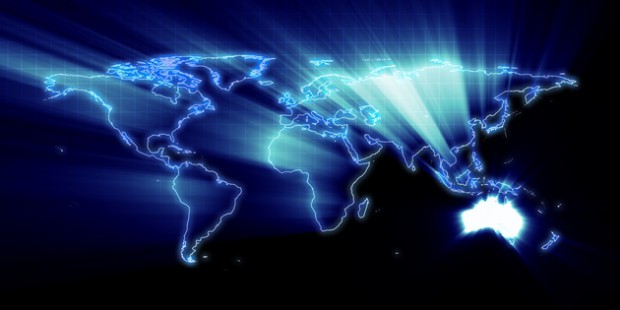
The 21st century economy is the era of globalisation, and ‘Australia in The Asian Century’ is clearly evident given the impending trade agreements between Australia and China, Japan and South Korea.
This follows the previous Government’s signing of a free trade agreement with Malaysia in 2012, and negotiation of agreements with Singapore and Thailand.
Given the marked cultural differences between Australia and China, success of these commercial relationships will require an unprecedented meeting of the minds to achieve the necessary cultural synergy.
Now, more than ever, Australia requires global talent. We need to develop responsible, ethical global leaders with the right global mindsets and intercultural capabilities – the essence of global leadership. Failure to so do could prove very costly for the Australian economy.
Global Leadership
Global leadership is the process of influencing the thinking, attitudes and behaviours of global communities (including individuals, groups and organisations) to achieve a collaborative approach in working toward common goals and visions. Therefore, global leadership is an increasingly vital asset for Australian organisations.
Effective global leadership, however, requires a global mindset.
Global Mindsets
Leaders with a global mindset:
- focus on the broader picture;
- accept life as a balance of contradictions;
- value diversity;
- trust organisational processes rather than structures;
- are comfortable with ambiguity; and
- are open to experience, themselves, and others.
Such leaders see the world as a whole. They scan from a broad perspective and search for commonalities, which they further explore to discover differences. Using the knowledge gained from this worldwide search, they design and execute strategies which maximise the benefits of their local and global stakeholders.
Having a global mindset means that leaders are aware of diversity across businesses, countries, cultures and markets. It also means they develop and interpret criteria and business performance independent from the assumptions of a single country, culture or context. In fact, such leaders are able to synthesise across diversity.
Leading with a global mindset entails a high level of mental complexity. It requires an external and open focus, and taking multiple and diverse perspectives into account.
Two important dimensions of a global mindset are: conceptualisation and contextualisation.
Conceptualisation refers to building mental models of the world; contextualisation is about adapting these mental models in action. Conceptualisation relates to mental capacity and thinking; contextualisation is about acting in the local environment or context.
Take, for example, a successful executive of a medium size Australian-based company who has always lived in Geelong (Victoria). The executive’s company is purchased by a Japanese company with existing operations in the Philippines and South America. The executive’s assignment is to integrate the Australian operating systems with Japan and the other locations. This will require strong conceptualisation skills on the part of the executive.
By contrast, the same Australian company has an executive who has lived and worked in France, Italy and Mexico who speaks four languages. This executive’s assignment in the new organisation is to move to the Philippines for at least 12 months and assume management of the Filipino operation. This executive will need stronger contextualisation skills than the manager in Geelong.
Developing Inter-Cultural Competence – Cultural intelligence (CQ)
Inter-cultural competence, or literacy, is directly related to cultural intelligence (CQ) – an individual’s capability to function effectively across cultures. This includes national, global and organisational culture. Developing this type of inter-cultural competence takes more than simply becoming aware of cultural-related issues and acquiring global knowledge.
The way we interact with people from other cultures is intimately linked to our own cultural identity.
Therefore, the best place to start building inter-cultural competence is by fully understanding our own ‘mono-cultural world view or perspective’. This includes cultural conditioning, bias, attitudes, preferences, behaviours, and – most importantly – understanding both the assets and risks they represent.
Developing a global leader entails assessing their capabilities across a wide array of intercultural competencies to take them to the next level, which should include:
- global business astuteness
- tolerance of ambiguity
- stakeholder and results orientation
- cosmopolitanism
- cognitive complexity
- emotional intelligence
- pattern recognition
- social flexibility
- change motivation
- learning agility
- ethics
- optimism
- non-judgmentalness
- self-confidence
- mindfulness and humbleness
- resilience
- curiosity
- overall leadership versatility
For leaders, the development of CQ and cultural competence is typically a three-stage developmental process:
1. Dependent
At this stage, leaders are still deeply embedded in their own culture and their organisation’s needs, values, traditions and practices. Leaders think in terms of ‘either/or’ and view cultural differences as threats.
2. Independent
During this stage, leaders see themselves as products of their past education, experience and culture.
3. Interdependent
At this final stage, leaders seek the greater good for their organisation and all their stakeholders. They think and act beyond familiar cultural conditioning and social class.
This is a truly transformational leadership development experience.
Transformational Leadership Development
Transformational leadership development requires transformative learning experiences.
This means the leaders are not only provided with information to acquire new knowledge, but with experiences that positively alter, or re-define, the way they see themselves as leaders.
Action learning programs, experiential learning, mentoring and coaching using 360-degree feedback results, helps leaders to confidently and safely explore unfamiliar territory by challenging their own mental models. As a result, they discover the possibilities of who they can become in the future. This provides them the confidence and ability to resolve issues, or achieve goals, that they previously perceived to be difficult or impossible. It is how they can achieve performance breakthroughs.
This approach provides leaders the capabilities to succeed with today’s business environment and imperatives. ‘Business as usual” is no longer enough, as it equates to mediocrity.
Author
Sebastian Salicru is a Global/Intercultural Strategic Leadership Advisor & Development, Facilitator and Executive Coach (Business Psychologist). He takes leaders and their teams to new levels in a globalised world where hyper-complexity is the new normal. Contact Sebastian on: sss@pts.net.au or 61+413 777 591.


